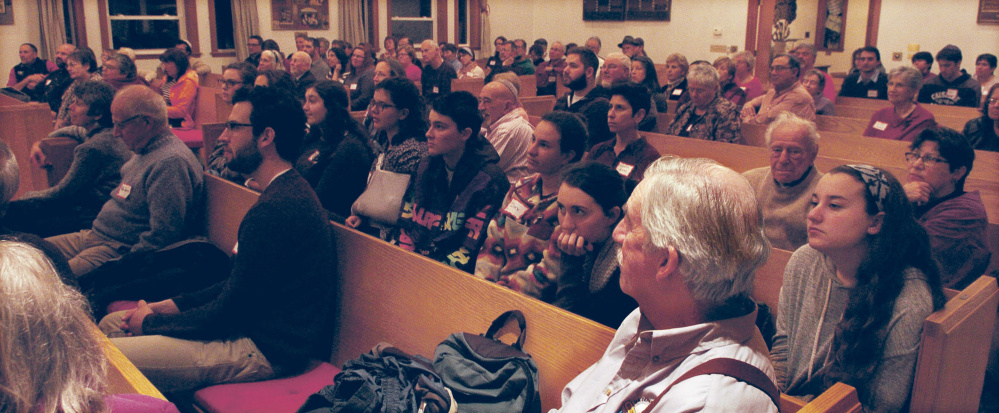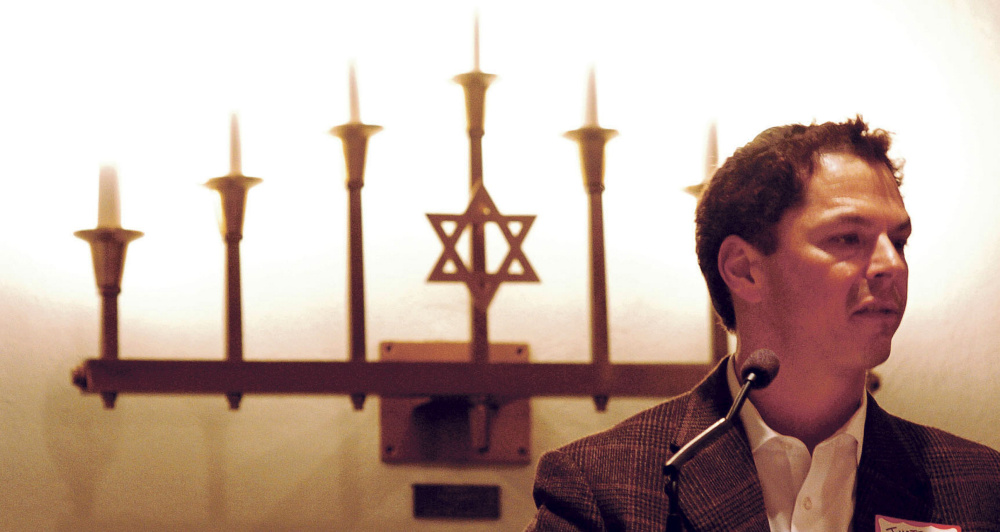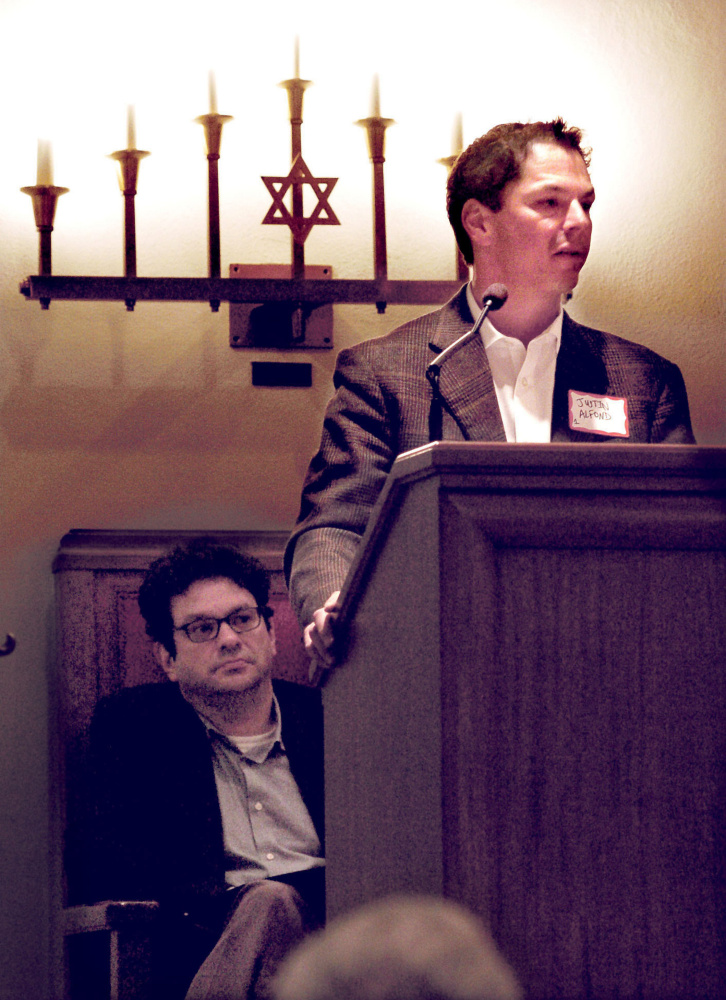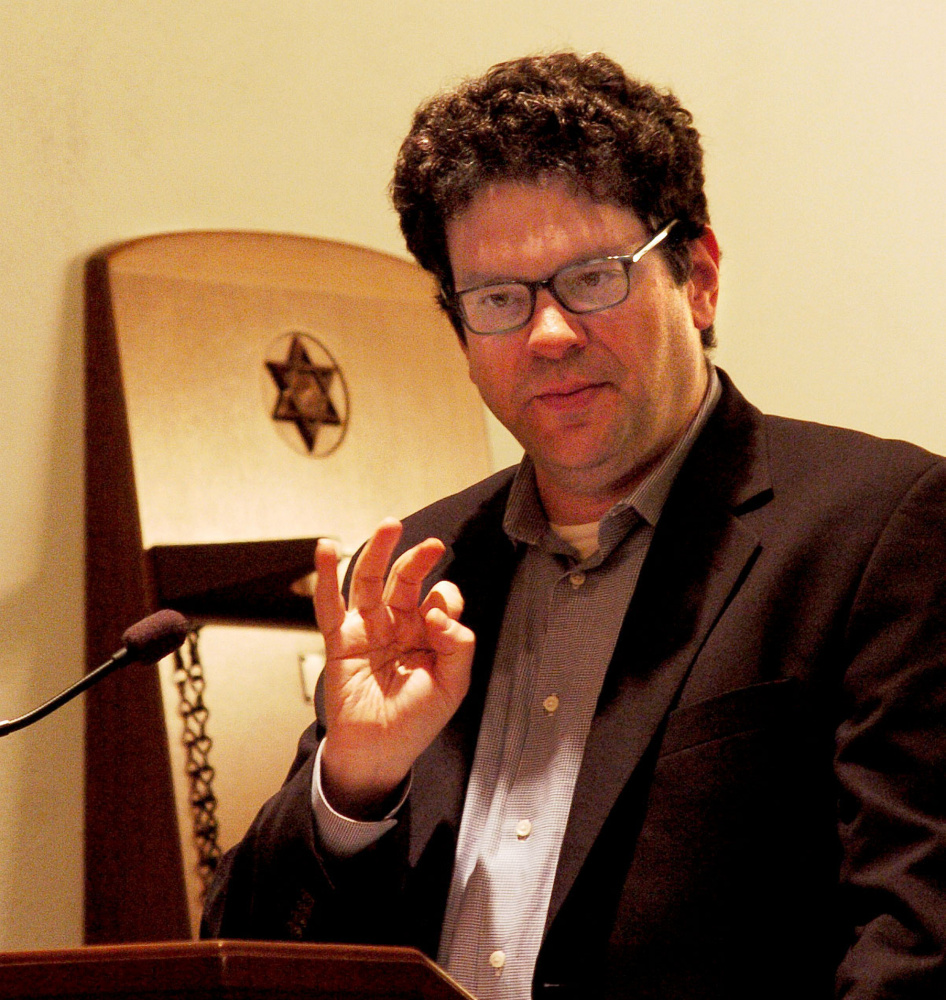WATERVILLE — State Sen. Justin Alfond speaks with Mainers all the time who say they work hard but struggle daily to make ends meet.
They tell him their wages are remaining flat, but expenses are increasing. When an unexpected bill arrives in the mail, they must set it aside and then find themselves taking on more and more debt.
“People I know tell me the notion of living paycheck-to-paycheck is a joke because the paycheck is never enough,” he said.
Alfond spoke Sunday night to about 100 people of all faiths who gathered at Beth Israel Congregation on Main Street to discuss income inequality and what society can and should do to help bridge the gap between the poor and the rich. Everyone ought to have access to fair wages, a good education, good health care and the ability to live without the stress of debt, according to Alfond. Too many Americans are living with the anxiety that accompanies living on the edge and it can be paralyzing, he said.
“This life is exhausting and truly unsustainable, and more people than you realize are living this every day,” said Alfond, a four-term senator and former senate president.
Sunday’s event, titled “Community Conversations,” was the first in a series of three discussions hosted by Colby College’s Center for Small Town Jewish Life and aimed at bringing people together to talk about issues of common concern. It was sponsored also by Wexner Alumni Collaboration Grants and co-sponsored by the Office of Religious and Spiritual Life, Oak Institute, Center for the Arts and Humanities and the Goldfarb Center for Public Affairs at Colby.
Alfond and Rabbi Shai Held, a theologian, scholar and educator from New York City, talked about the moral obligation people have to help solve the problem of income inequality and ensure everyone has access to education, health care and other necessities so they may live comfortably and with dignity.
Held, co-founder, dean and chair in Jewish thought at Mechon Hadar where he also directs the Center for Jewish Leadership and Ideas, said we are first and foremost human beings, described in the Bible as brothers.
We must therefore think of people who are suffering as familial brothers and sisters, said Held, who served as director of education at Harvard Hillel and has been named multiple times to Newsweek’s list of the 50 Most Influential Rabbis in America.
The Bible says it is an illusion to think that one is worth more because he has more or that a person is worth less because he has less, according to Held.
“If you are suffering and I have a lot, it’s not just that I have to share with you,” Held said. “How could I not? You’re my sister.”
Held spoke of Jewish law and the idea that a person is prohibited from having money or credit cards or any manifestation of wealth on Shabbat, or the Sabbath, so that a billionaire and a pauper have exactly the same thing in their pockets, and at that moment they are equal in God’s eyes.
People find ways to show off their wealth, Held said, but when they put their wallets down, they discover truth — that poor and rich are human beings, both loved by God.
Rabbi Rachel Isaacs of Beth Israel welcomed Alfond, Held and about 100 audience members, including Colby students and staff, legislative leaders and people from various religious institutions.
Alfond, who grew up in Waterville and said he experienced his bar mitzvah at Beth Israel, said the top one percent of people in the U.S. take home more than 20 percent of the nation’s income, and the middle class is being ripped apart. The lack of a middle class is changing the way the country is able to grow, he said.
Fifty percent of Mainers said in a poll that they are so financially insecure that an unexpected bill of $400 would turn their lives upside down, he said.
Working to raise wages so people may pay their bills, taking steps to help end hostilities between employees and employers, supporting children and teachers to ensure a high quality of education and making sure children have access to nutritious food would help alleviate the problems, according to Alfond. Protecting the environment and investing in the common good are key, he said.
“If we don’t take these steps, to me, we’re in for rockier times ahead,” Alfond said.
Income inequality fuels feelings of disenfranchisement, he said, and elected officials must play a lead role in ensuring the economic system is fair.
“We need to fight for the small guy,” said Alfond, grandson of philanthropists Harold and Dorothy “Bibby” Alfond.
After the discussion, the group continued related conversations over coffee and dessert. Two more events in the series at Beth Israel will focus on philanthropy and dignity and are scheduled for 6:30 p.m. Jan. 18 and April 2. The events are free and open to the public.
Amy Calder — 861-9247
Twitter: @AmyCalder17
Copy the Story LinkSend questions/comments to the editors.







Success. Please wait for the page to reload. If the page does not reload within 5 seconds, please refresh the page.
Enter your email and password to access comments.
Hi, to comment on stories you must . This profile is in addition to your subscription and website login.
Already have a commenting profile? .
Invalid username/password.
Please check your email to confirm and complete your registration.
Only subscribers are eligible to post comments. Please subscribe or login first for digital access. Here’s why.
Use the form below to reset your password. When you've submitted your account email, we will send an email with a reset code.